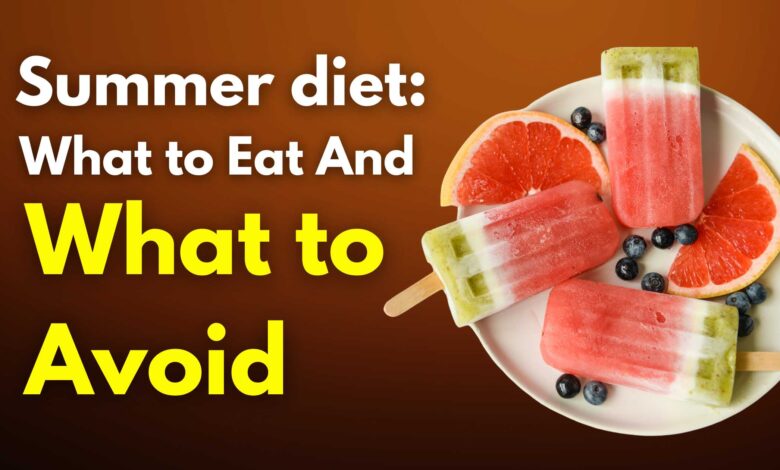5 Summer Diet: What to Eat And What to Avoid

Summer Diet: As the days get warmer and longer, summer invites us to embrace its warmth and energy. In addition to outdoor fun and sunshine, this season also turns to food cravings and cravings. Eating light, warm, summer foods is essential to maintaining good health and well-being during the warmer months. In this article, we’ll explore the basics of summer eating, including what to eat to stay strong and hydrated, and what to avoid to stay healthy and active.
Table of Contents
Summer Diet: Include Fresh Fruits And vegetables:
Keep Hydrated And Electrolytes:
Proper watering is important all year round, but even more so in the summer months. Drinking plenty of water helps regulate body temperature, support digestion, and maintain overall health. In addition to water, consider adding energy-efficient drinks, such as coconut water or homemade energy drinks, to replace fluids and minerals lost in the heat. Limit consumption of sugary sodas, energy drinks, and excessive caffeine, as they can cause dehydration and other health problems.
Choose Light And Refreshing Foods:
Summer meals should be light, healthy, easy to digest, keep you strong, full, and not heavy. Choose grilled or steamed vegetables, lean proteins like fish or chicken, and whole grains like quinoa and brown rice. Add warming options like yogurt, gazpacho and cold soup to hydrate your body while beating the heat. Avoid greasy and heavy foods, which will make you sluggish and uncomfortable on hot summer days.
Limit Processed Foods and Sugar:
While it’s easy to reach for ice cream and sweets in the summer, eating too many processed foods and sweets can affect your health and well-being. Instead, choose healthier options like frozen fruit popsicles, homemade smoothies, Greek yogurt and fresh fruit for a fresh snack and meal. Cut down on processed snacks, sugary foods, and fried foods, which can lead to weight gain, inflammation, and other health problems.
Exercise the Diet and Control The Components:
In addition to choosing nutrient-dense foods, practicing mindful eating and portion control are key to maintaining a healthy diet this summer. Pay attention to your feelings of hunger and fullness, eat slowly and mindfully, enjoy the taste and texture of your food. Choose small, frequent meals and snacks to maintain energy levels throughout the day. Avoid snacking and eating too much, especially when sitting out and going to heavy summer events.
Also Read: Popular Books to Read for Personal Growth
Conclusion:
In short, eating a summer diet comprised of fresh fruits and vegetables, hydrating drinks, and light, nutritious meals is essential for staying healthy and active during the warmer months. By choosing healthy foods, staying hydrated, and maintaining a healthy diet, you can nourish your body, increase energy, and stay in shape. of all summer. Additionally, avoiding processed foods, sugary foods, and overeating can help you maintain a healthy weight and reduce your risk of long-term chronic disease. By eating a balanced and sensible diet, you’ll feel good all summer long and support your overall health.




